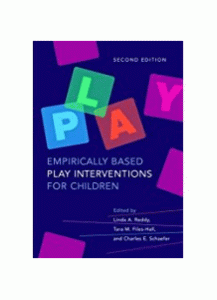Empirically Based Play Interventions for Children

“Empirically Based Play Interventions for Children”
Edited by Linda A. Reddy, Tara M. Files-Hall, and Charles E. Schaefer
American Psychological Association
Washington, D.C., 2016
Book on play therapy filled with advice, direction
Reviewed by James K. Luiselli, Ed.D., ABPP, BCBA-D
Play therapy is perhaps the oldest and most popular therapeutic approach with children. Importantly, there are different theoretical models for implementing play interventions, notably client-centered, cognitive-behavioral, family, and psychodynamic, among others. As this book makes clear, most child therapists have traditionally combined interventions without regard to unifying concepts and principles.
However, play therapy has been and is often dismissed because of limited research and evidence-based support. More recently, this situation has improved, with several meta-analyses suggesting that play therapy has a moderate-to-large treatment effect.
The book is directed at practitioners and researchers as “a unique clinical reference that presents evidence-based and maximally useful play interventions for a variety of child populations and settings.”
The editors focus on play interventions that are guided by developmental theory, have demonstrated effectiveness, and been empirically validated.
Part 1 of the book includes chapters devoted to play-based prevention programs. Later parts address targeted play therapies such as cognitive-behavioral play therapy (CBPT) and parent-child interaction therapy (PCIT) for children with internalizing (anxiety, depression, trauma), externalizing, and developmental disorders.
The final chapter of the book summarizes the current status and future directions of play interventions. This contribution synthesizes outcome research and offers recommendations for practice, training and policy.
There is good uniformity among the book chapters, each one describing the theoretical foundations and key ingredients comprising a particular play intervention. Also, the chapters have a distinctive practice emphasis by including therapy transcripts, case examples and therapist-child dialogue.
This book succeeds on many levels but most effectively by explaining the empirical base of contemporary play therapies. Indeed, the book shows convincingly that current play interventions with children are very different from decades ago, thanks to the exemplary work of the editors and the authors they chose to write chapters.
Nonetheless, there is more work ahead to solidify play therapy as a valuable therapeutic approach within child mental health practice. Some of the highlighted objectives emerging from the chapters are developing play intervention protocols that support treatment fidelity, incorporating standardized outcome measures, conducting replication and follow-up studies and refining research-to-practice translation.
I recommend this must-read book for any child therapist regardless of theoretical orientation. It is filled with advice and direction, integrated thinking, and an orientation that embraces the common ground among seemingly disparate disciplines.
The book will also resonate with students pursuing education and a career in child psychology, counseling, and social work, giving them the best appraisal of how play therapy works from the perspective of a scientist-practitioner.
James K. Luiselli, Ed.D., ABPP, BCBA-D, is Chief Clinical Officer, Clinical Solutions, Inc. and North East Educational and Developmental Support Center, Tewksbury, Mass.
Learn more about the book: Empirically Based Play Interventions for Children
